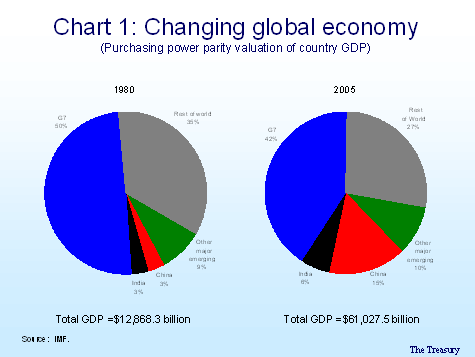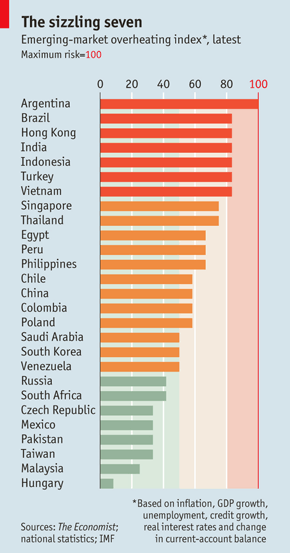What Is An Emerging Market Economy
Post on: 16 Март, 2015 No Comment

What Exactly Is an Emerging Market?
On September 18, 2008, the Economist argued that the term emerging market is dated.
Is it time to retire the phrase “emerging markets”? Many of the people interviewed for this special report think so. Surely South Korea, with sophisticated companies such as Samsung, has fully emerged by now. And China already has the world’s fourth-largest economy. [ Note: As of summer 2010, China has the world’s second-largest economy.]
www.economist.com/node/12080703.
The 2008 article clearly articulates the challenge for global businesses, as well as analysts, who are trying to both define and understand the group of countries typically termed the emerging market. In a 2008 Forbes article, Vladimir Kvint, president of the International Academy of Emerging Markets, noted the following:
During the last 20 years, the global business world has gone through drastic, but mostly positive changes. In the 1980s, international business was essentially an exclusive club of the 20 richest countries. This changed as dictatorships and command economies collapsed throughout the world. Countries that once prohibited foreign investment from operating on their soil and were isolated from international cooperation are now part of the global marketplace.
www.forbes.com/2008/01/28/kvint-developing-countries-oped-cx_kv_0129kvint.html.
The definition of an emerging market is complex and inconsistent. As discussed in the section called “Classifying World Economies”. there is a plethora of statistics and data available. The application and interpretation of this information varies depending on who is doing the analysis—a private sector business, the World Bank, the International Monetary Fund (IMF), the World Trade Organization (WTO), the United Nations (UN), or any number of global economic, political, and trade organizations. The varying statistics, in turn, produce a changing number of countries that “qualify” as emerging markets. For many businesspeople, the definition of an emerging market has been simply a country that was once a developing country but has achieved rapid economic growth, modernization, and industrialization. However, this approach can be limiting.
Knowing that there are wide inconsistencies, how do we define emerging markets consistently from the perspective of global businesses? First, understand that there are some common characteristics in terms of local population size, growth opportunities with changes in the local commercial infrastructure, regulatory and trade policies, efficiency improvements, and an overall investment in the education and well-being of the local population, which in turn is expected to increase local incomes and purchasing capabilities.
www.forbes.com/2008/01/28/kvint-developing-countries-oped-cx_kv_0129kvint.html.
In April 2010, the chief of HSBC, the largest bank in Europe, forecasted a change for the next ten years in which six new countries (the CIVETS: Colombia, Indonesia, Vietnam, Egypt, Turkey and South Africa) will replace the BRIC countries (Brazil, Russia, India and China) of the last decade:
“Each has a very bright future,” HSBC CEO Michael Geoghegan said of the CIVETS, named after the cat-like animals found in some of the countries. “Each has large, young, growing population. Each has a diverse and dynamic economy. And each, in relative terms is politically stable.”…
“Within three years, for the first time, the economic firepower of emerging markets will overtake the developed world, measured by purchasing power parity. It’s a defining moment.”

The size of the emerging market middle class will swell to 1.2 billion people by 2030, from 250 million in 2000, he said.
That bodes well for financial services, as households tend to open bank accounts and ask for other products when income reaches about $10,000, Geoghegan said.
www.reuters.com/article/idUSLDE63Q26Q20100427.
www.ft.com/cms/s/0/f717c8e8-21be-11e0-9e3b-00144feab49a.html#ixzz1MKbbO8ET.
The Financial Times continues to note how the
www.ft.com/cms/s/0/f717c8e8-21be-11e0-9e3b-00144feab49a.html#ixzz1MKbbO8ET.
These opinions and analyses by different economists are highlighted in this chapter to illustrate that the category of emerging markets is complex, evolving, and subject to wide interpretation. So how then do savvy global professionals sort through all of this information? Managers focus on the criteria for emerging markets in an effort to take advantage of newly emerging ones. While there are differing opinions on which countries are emerging, it’s clear that global businesses are focused on the groups of countries offering strong domestic markets. Many of these emerging-market countries are also home to companies that are taking advantage of the improved business conditions there. These companies are becoming world-class global competitors in their industries. Regardless of which definition or classification is used, the largest emerging markets remain lucrative and promising. [172 ] The sections that follow are excerpted in part from two resources owned by author Sanjyot P. Dunung’s firm, Atma Global: CultureQuest Business Multimedia Series and bWise: Business Wisdom Worldwide. The excerpts are reprinted with permission and attributed to the country-specific product when appropriate. The discussion about Asia also draws heavily from the author’s book Doing Business in Asia: The Complete Guide. 2nd ed. (New York: Jossey-Bass, 1998).














